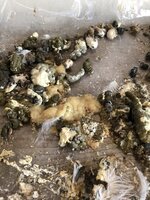greggooo
Happy Chickens!
Our sweet hen, Sweetums passed a lash egg a couple of weeks ago. The vet put her on antibiotics and meloxicam, an anti-inflammatory.
She started pooping this, the light brown gelatin-type stuff. Our main aviary vet is out of town for thew holidays, the other vets see chickens and are very good, but they have no idea what this is. Possibly salpingitis they say? She is back on the anti-inflammatory.
Does anybody Know what this is and what to do? She has been pooping it for a couple of days.
She started pooping this, the light brown gelatin-type stuff. Our main aviary vet is out of town for thew holidays, the other vets see chickens and are very good, but they have no idea what this is. Possibly salpingitis they say? She is back on the anti-inflammatory.
Does anybody Know what this is and what to do? She has been pooping it for a couple of days.





